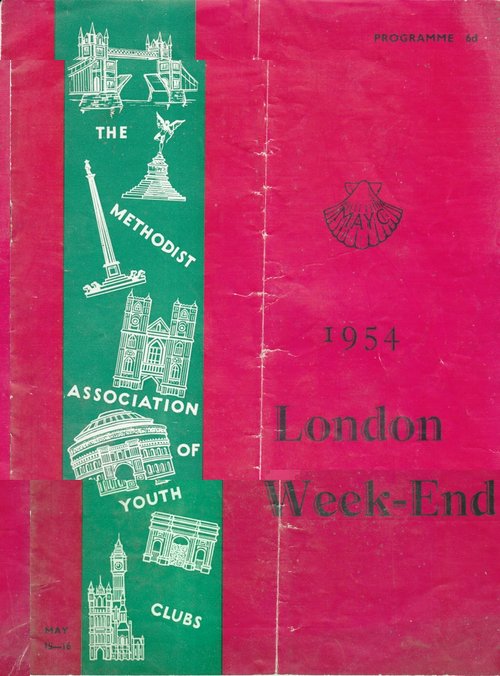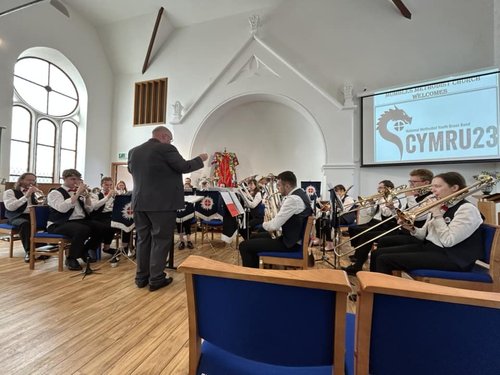"Create a group; grow real persons; encourage a sense of belonging; work towards wholeness; go for the best; live on a large map; take your place in the Church."
The seven guiding principles of the MAYC Charter Clubs.
Following the setting up of the Methodist Youth Department in 1943, with Douglas Griffiths as secretary responsible for Youth Clubs, the Methodist Association of Youth Clubs was formally launched at a 'Clubs Congress' in Westminster Central Hall on 2 June 1945, addressed by Sir Stafford Cripps MP and followed by a 'Display and Launching Ceremony' in the Royal Albert Hall. 'Youth Parliaments' held in many youth groups, and the 'Seven Guiding Principles' worked out by Griffiths and Glyn Amos helped to provide an identity for the new approach to youth work as non-paternalistic and participatory. This eventually led to the establishment of the MAYC National Members Council in 1966 and the inclusion of young people in the leadership of the movement at every level.
Under the leadership of Len Barnett in the 1950s, youth work training weekends were set up at Willersley Castle and The Links, Eastbourne. The London Weekend grew, so that two performances of the Royal Albert Hall show were needed. The film 'Young, Strong and Free' (1951) showed the wide variety of sports, competitions, drama, conferences, dances devotions and other activities developing in MAYC. The call to Christian discipleship had a vital place in it all and many young people responded.

The 1960 Albermarle Report recognised the partnership between the state and voluntary agencies, including the churches, in the Youth Service. MAYC became eligible for Government grants and local authority support. A fund-raising scheme 'Tractors for the Hungry' was initiated by Bill Cockell, By the mid-1960s some churches were developing full-time Youth Centres and employing professional workers. The MAYC Voluntary Service scheme encouraged volunteering to work in Europe and other parts of the world. From the mid-1960s field staff were appointed to work in the Districts, with grants from local education authorities and from the Joseph Rank Benevolent Trust. In 1966 the first MAYC provincial weekend was held in Manchester, which became an autumn event in various parts of the country alongside the London Weekend in May.
During the 1970s the number of youth fellowships increased, alongside clubs and other youth groups. This was also a period of increasing involvement with other major national voluntary youth organisations. Against a background of change and social unrest in the 1980s, MAYC was seeking a sharper edge in the Christian mission among young people by developing a wider awareness of the social and political dimensions of faith alongside strengthening commitment to Christian evangelism and the nurture of young disciples.

In 1983 a Director of Music was appointed to develop the orchestra which had been part of the London Weekends since the 1970s and the MAYC Orchestra and Singers was launched. The annual 'Youth Makes Music, Dance and Drama' event, the National Methodist Youth Brass Band, the British Methodist Youth Choir and the MAYC Orchestra and Singers provided inspiration and opportunity for young people to use and develop their talents. Following the withdrawal of financial support from the Methodist Connexion, in 2009 the Orchestra and Singers became an independent charitable company under the new name of OneSound.
The London Weekend grew in popularity an scope during this decade, increasing to about 12,500 participants. But consideration of connexional restructuring at the end of the '80s raised questions about the strength of the national MAYC team, especially in the face of drastic cuts in government funding for the Youth Service. The diversity which had evolved in Methodist youth work and the advancing age of local leaders inspired by the post-war vision of the Church and the leadership of Douglas Griffiths challenged the connexional Youth and Community Committee to undertake serious reflection on sustaining this vibrant youth movement.
In 1985 the Fortieth Anniversary of MAYC, coinciding with International Youth Year, provided opportunities to further develop youth participation in both MAYC and the Church. In 1995 an annual Youth Conference (renamed Youth Assembly in 2009 [and now know as 3Generate]) brought together representatives from every District to discuss matters on the Methodist Conference agenda. A Youth President was appointed and 'Another Conference' was established. Districts were asked to appoint at least one under-25-year-old to Conference each year.
Authored by David J. Winwood and Mark H. Wakelin for DMBI: A Dictionary of Methodism in Britain and Ireland